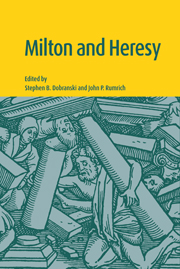Book contents
- Frontmatter
- Contents
- List of contributors
- Acknowledgments
- Abbreviations
- Introduction: Heretical Milton
- PART I HERETICAL THEOLOGY
- PART II HERESY AND CONSEQUENCES
- PART III HERESY AND COMMUNITY
- PART IV READERS OF HERESY
- 11 Asserting eternal providence: John Milton through the window of liberation theology
- 12 Milton's transgressive maneuvers: receptions (then and now) and the sexual politics of Paradise Lost
- Index
12 - Milton's transgressive maneuvers: receptions (then and now) and the sexual politics of Paradise Lost
Published online by Cambridge University Press: 10 October 2009
- Frontmatter
- Contents
- List of contributors
- Acknowledgments
- Abbreviations
- Introduction: Heretical Milton
- PART I HERETICAL THEOLOGY
- PART II HERESY AND CONSEQUENCES
- PART III HERESY AND COMMUNITY
- PART IV READERS OF HERESY
- 11 Asserting eternal providence: John Milton through the window of liberation theology
- 12 Milton's transgressive maneuvers: receptions (then and now) and the sexual politics of Paradise Lost
- Index
Summary
he Ever was a Dissenter…
Jonathan RichardsonI'm increasingly uncertain, with Milton in particular, as to whether we have a way of talking about what it is that Milton is actually doing in Paradise Lost. I reject completely the orthodox accounts … Milton more even than Blake is an instance of someone who so persuasively redefines tradition, including Christianity itself, that he makes it entirely in his image … his orthodoxy is such a powerful transumption of Christian orthodoxy … that we can only speak of the Miltonic. To call him a Christian poet is… to beg the question in the extreme.
Harold BloomThere may be only one Milton, but in Paradise Lost there are at least two texts circulating at once: in the words of Richard Corum, one of “obedient submission” and another of “subversive mutiny.” This fact alone casts doubt upon the proposition that “students … would learn just as much about poetry from a professor who thought Milton was a sexist as they would from one who didn't,” only because the initial thesis (that Milton is a sexist) requires that attention be given to the first of these texts, while the second thesis (that Milton was not a sexist) cannot be seriously addressed without engaging the inner workings of both texts – their dynamic tensions and complicated interactions. One lesson to learn from these two texts, read in conjunction, is that Milton's poem is an arena for conflict, a battleground for warring values, for contrary theologies, philosophies, and politics. Milton thus gives voice to inconsistencies and to contradictions within his culture that often he cannot transcend.
- Type
- Chapter
- Information
- Milton and Heresy , pp. 244 - 266Publisher: Cambridge University PressPrint publication year: 1998
- 5
- Cited by

